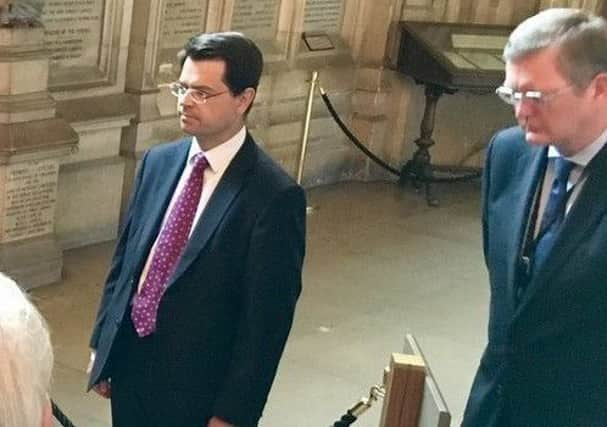Ben Lowry: At just the wrong time, amid chronic British weakness, the NIO loses one of its key advisors


It is weakness on a range of issues, and horribly apparent even on the legacy of past (incredibly, given Ireland’s historic refusal to extradite terrorists, NIO ministers have even been weak as Irish ministers highlight Troubles cases it thinks are embarrassing to Britain).
Days after this column highlighted such weakness, my colleague Sam McBride broke new developments on a case that illustrates the weakness, removal of royal portraits from Stormont House.
Advertisement
Hide AdAdvertisement
Hide AdJulian Smith, the new secretary of state, then issued a confusing (and prickly in tone) press release on the saga.
Either he was not advised on the release, in which case he plainly needs advice, or he was advised – in which case he needs new advisors.
First, Mr Smith mentioned that he was delighted to arrive in the job to a portrait of the Queen in his office, which left open the possibility that it has been put there shortly before he joined. Then he said there were royal portraits in Hillsborough Castle, and that Northern Ireland enjoyed many royal visits.
He also said he recognised “the importance of the NIO being an open and inclusive place to work”.
Advertisement
Hide AdAdvertisement
Hide AdSo what was he saying? That royalty, royal images and visits are part of the cultural hinterland at the NIO, as you might expect in Her Majesty’s government?
Or that the NIO interprets ‘inclusivity’ to mean that such imagery is a problem? If he is not saying the latter, why cite inclusivity?
Then, around the same time that we revealed further details of this shambles, and Mr Smith’s inept response, it emerged that the NIO had lost a key advisor, Jonathan Caine.
Lord Caine, as he has been since 2016, has been an advisor on Northern Ireland matters to two prime ministers since 2010, David Cameron and Theresa May, and four secretaries of state Owen Paterson, Theresa Villiers, James Brokenshire and Karen Bradley.
Advertisement
Hide AdAdvertisement
Hide AdBut his experience is greater than the last nine years of Tory rule. He was involved in the party in the 1990s, when he advised the NI secretaries Peter Brooke and Patrick Mayhew, prior to Tony Blair taking office in 1997.
It is essential that NIO ministers have this sort of high level advice from people who know what is going on, and have an institutional memory of politics in the Province.
In Lord Caine’s case, such NI experience is unrivalled in Westminster or the Tory Party, yet he has not been kept on by Mr Smith.
In case any unionists have somehow not yet noticed, we are deep in crisis on a range of issues: cultural, constitutional, historical and legal.
Advertisement
Hide AdAdvertisement
Hide AdThe Irish government is increasingly adopting a joint stewardship approach to Northern Ireland.
Lord Caine is one of few people, if not the only person, who tried to push back against this from a moderate unionist perspective.
That is not to say his advice was always listened to. Patently, and regrettably, it wasn’t. There are competing voices and a long-standing culture of deference to Ireland’s Department of Foreign Affairs (DFA).
As this column noted last week, NIO ministers will now almost never so much as verbally challenge the relentlessly partisan Irish. In the past, Owen Paterson and Theresa Villiers sometimes challenged it.
Advertisement
Hide AdAdvertisement
Hide AdMr Smith urgently needs an experienced voice who will explain to him when joint statements with Simon Coveney are appropriate, and when they are not. A voice who will tell him when to ignore demands of his senior officials or of Dublin.
That voice is now gone.
Alarmingly, I understand that Lord Caine at times tried to resist Irish overreach in various talks, and their failure to observe the three strands, which dictate when Irish input is apt, but did not always find unionist politicians inclined to take a robust stance (I am told Arlene Foster was not so reticent).
One immediate way to lay down a marker is to reinstate the NIO portraits, and face down complaint.
A further is to make clear that London will pursue legacy cases, such as funding civil actions against terrorists and setting up inquiries, given that republicans are relentlessly chasing the past and Ireland has tried to humiliate the UK at both the Strasbourg human rights court and the Council of Europe (London should do so using methods outside structures that might come out of the legacy bill, which is pitifully inadequate for such essential rebalancing).
Advertisement
Hide AdAdvertisement
Hide AdAnother is to insist that the talks process faithfully uphold the three stranded approach and to observe the constitutional proprieties of Dublin’s role.
Meanwhile, now that Boris Johnson is styling himself minister for the Union, he could perhaps now draw on Lord Caine’s experience.
• Ben Lowry (@BenLowry2) is News Letter deputy editor
• Ben Lowry last week: Julian Smith needs to reverse NIO weakness